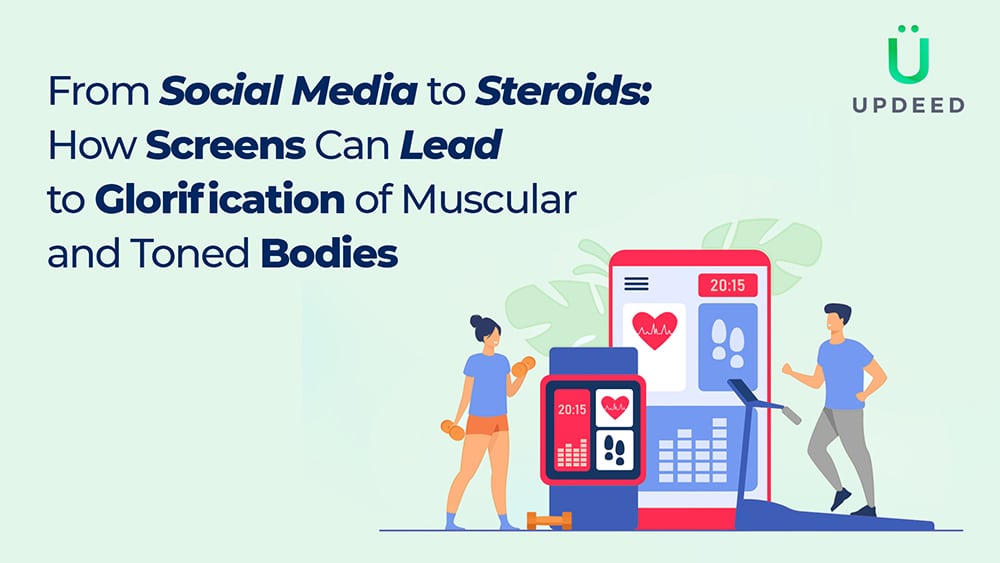From Social Media to Steroids: How Screens Can Lead to Glorification of Muscular and Toned Bodies
A recent publication in Eating and Weight Disorders investigated the correlation between screen usage and muscle dysmorphia symptoms – a form of body dysmorphic disorder where an individual perceives themselves as frail, despite being physically fit and healthy.
So, what exactly researchers observed?
According to the study findings, young men who spent more time texting and using social media exhibited more severe symptoms, while young women who spent more time texting, video chatting, and watching videos also showed a correlation with increased symptoms.

More common in men
In today’s digital age, we spend more time than ever in front of screens. From smartphones and laptops to television and video games, screens have become integral to our daily lives. While screen use has its benefits, it also has its downsides.
One of these downsides is the potential for developing muscle dysmorphia, a disorder characterised by a distorted perception of one’s body image.
Muscle dysmorphia, also known as “bigorexia,” is a subtype of body dysmorphic disorder (BDD). It is more common in men and is characterised by an obsessive preoccupation with muscularity and a distorted belief that one’s body is too small or not muscular enough. Individuals with muscle dysmorphia may engage in excessive exercise, weightlifting, and other activities to increase muscle mass. They may also use supplements and steroids to enhance their physique.
Fitness influencers and bodybuilders use these platforms to showcase their physiques and share their workout routines, often promoting the use of supplements and steroids. This can be especially dangerous for young adults and teenagers, who are more susceptible to the influence of social media. The symptoms of muscle dysmorphia can vary from person to person but typically include:
- Obsessive preoccupation with muscularity
- A distorted perception of one’s body image
- Spending excessive time at the gym or engaging in other physical activities
- Using supplements and steroids to enhance muscle mass
- Anxiety and depression related to body image
- Avoiding social situations due to concerns about body image
- Disordered eating patterns
Individuals with muscle dysmorphia may experience muscle strains and other injuries due to excessive exercise. They may also develop eating disorders and experience depression and anxiety related to their body image.
A growing concern
The increasing emphasis on physical appearance and glorifying muscular and toned bodies has led to an obsession with achieving an idealised body type.
It can lead to excessive exercise and using supplements and steroids to achieve a muscular physique. This can strain the body and increase the risk of injury. Using supplements and steroids can also have long-term health consequences, including liver and kidney damage, hormonal imbalances, and cardiovascular problems.
Muscle dysmorphia can also impact an individual’s mental health. It can lead to anxiety and depression related to body image, social isolation, and disordered eating patterns. Individuals with muscle dysmorphia may avoid social situations and experience difficulties in relationships due to concerns about their body image.
In addition to these individual impacts, muscle dysmorphia can have broader societal impacts. The glorification of muscular and toned bodies can create unrealistic expectations for physical appearance, leading to body shaming and discrimination against individuals who do not conform to these standards. This can contribute to negative self-image and feelings of inadequacy in individuals who do not meet these standards.
In conclusion, it is important to be mindful of the impact that screens can have on our body image and to seek help if we are experiencing symptoms of muscle dysmorphia. With the right treatment, individuals can overcome their obsessive preoccupation with muscularity and develop healthier relationships with their bodies.
Ready to make a positive impact in the world?
UPDEED is the place for you. Our free and open platform is filled with inspiring stories from individuals and organizations who are making a difference in their communities and beyond. Connect and collaborate with like-minded individuals from around the globe on UPDEED, and discover your own potential to create meaningful change. Join our community and make a difference.





